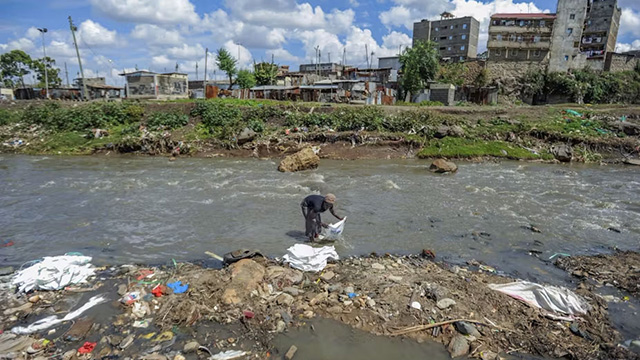
‘Forever chemicals’ are polluting African waters: Lake Victoria, South Africa’s Vaal and Kenya’s Nairobi rivers are hotspots
It’s clear from our findings that forever chemical contamination, while under-reported compared to industrialised countries, is a widespread, pressing environmental issue on the continent.
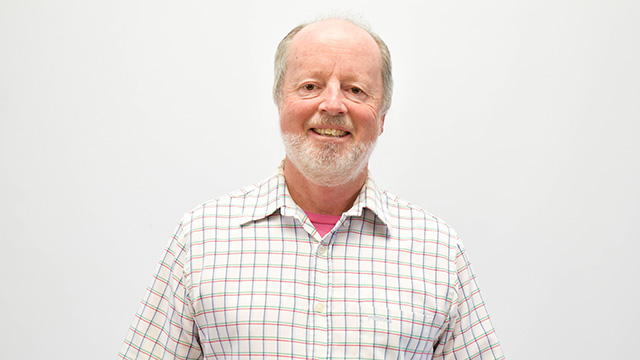
Rhodes University Distinguished Professor Charlie Shackleton earns A1 rating by NRF
Distinguished Professor Charlie Shackleton, holder of the SARChI Chair in Interdisciplinary Science in Land and Natural Resource Use for Sustainable Livelihoods at Rhodes University, has been awarded the prestigious A1 National Research Foundation (NRF) rating, the highest in the South African national system of research innovation.

Rhodes University rallies for resilience: Dr Jessica Cockburn’s award-winning engagement celebrated
In a recent gathering at Rhodes University, the Deputy Vice-Chancellor: Student and Academic Affairs, Professor 'Mabokang Monnapula-Mapesela, set the stage for an evening dedicated to celebrating community engagement. She emphasised the significance of the Vice-Chancellor’s Distinguished Community Engagement Award, an accolade honouring impactful collaborations between the university and its surrounding communities in education and research. “The Vice Chancellor’s Distinguished Community Engagement Award is a prestigious and competitive Annual Award that recognises meaningful and committed partnerships between the members of the university and community partners in the areas of teaching, learning, and research, where human and material resources of the university have been combined with assets found in the local communities”.
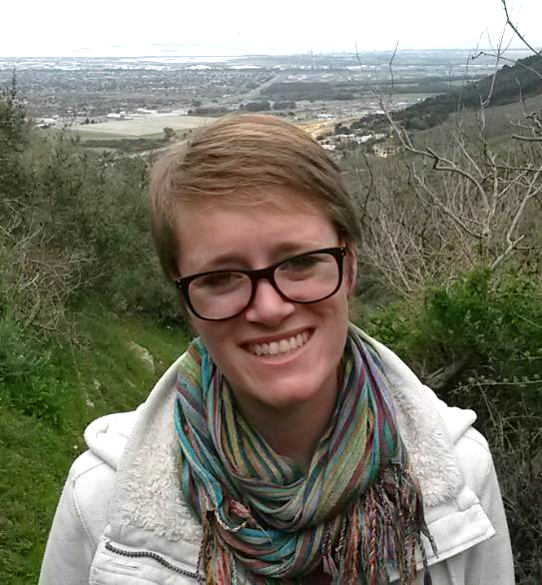
2023 Vice Chancellors Distinguished Community Engagement Award
Dr Jessica Cockburn is the recipient of the 2023 Vice Chancellor’s Distinguished Award for Community Engagement. Dr Cockburn wins this award for her leadership and coordination of several projects including the River Rescue service-learning course and Tsitsa Project.
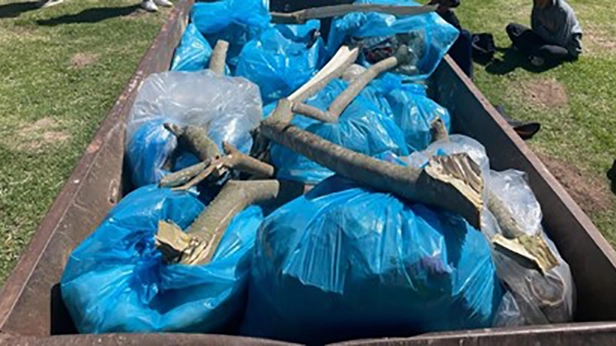
Makhanda's River Rescuers do their housework for the planet
Makhanda's River Rescuers put in a big effort this past weekend to do their housework for the planet. Helen Holleman of River Rescue calls it the "Spring Cleaning". The efforts were driven by a service learning partnership between River Rescue and the Rhodes University Department of Environmental Science, along with contributions from other partners.
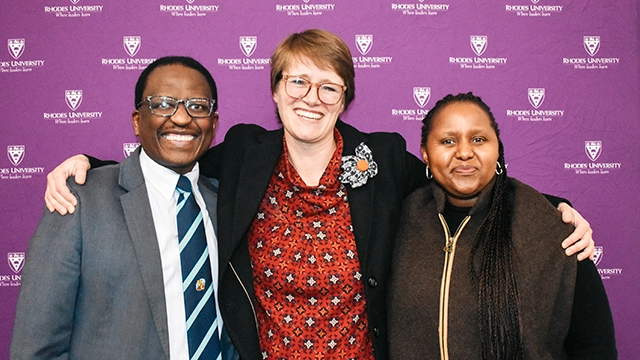
From Three Cs to Three Ss - Dr Cockburn's remote teaching journey
On 20 July 2023, Dr Jessica Cockburn gave her 2021 Special Vice-Chancellor's Distinguished Teaching Award Lecture titled: "Becoming a teacher in turbulent times: cultivating connection and care in context". The event was well-attended by Dr Cockburn's friends, family, fellow lecturers and students.
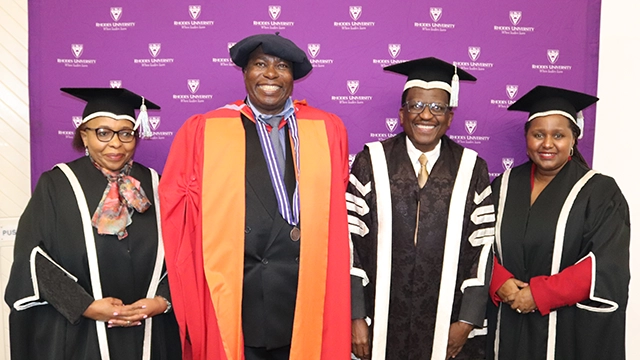
Looking back and into the future with Professor James Gambiza
Rhodes University's Eden Grove Blue Lecture Theatre was abuzz with excitement as scholars from various fields gathered to witness the inaugural address of Professor James Gambiza. The event, a prestigious milestone in an academic's career, marks the conferral of full professor status on a scholar who has showcased exceptional scholarly contributions to their discipline.
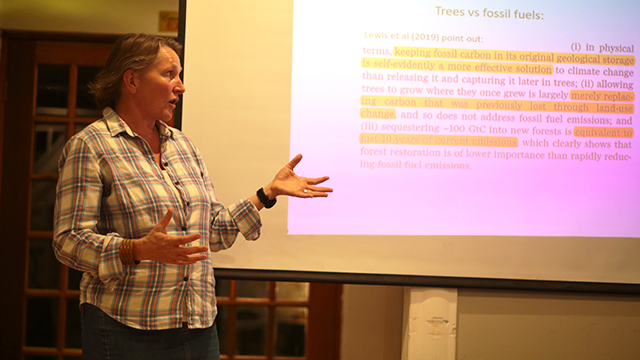
We need to stop thinking more trees will fix the climate crisis
Fighting climate change is high on the world’s agenda, and many believe planting trees is a powerful way to fix the crisis. Forests can capture and store carbon dioxide (CO2), the main culprit behind our warming atmosphere. But Associate Professor Susi Vetter, from the Rhodes University Botany Department, argues that the drive to reforest the earth can be misleading and, at worst, harmful to people and the planet.
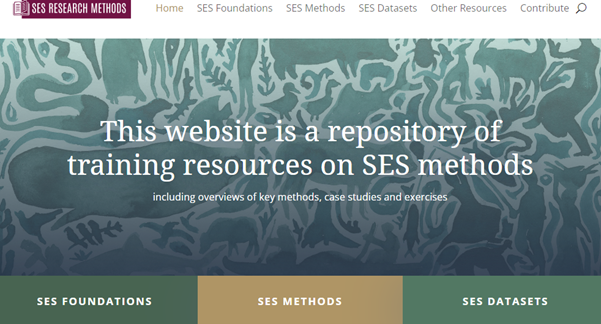
SES Methods website launched
Dr. Alta De Vos recently helped launch a website on methods for social-ecological systems.
_copy.webp)
Crime is lower when cities are greener: evidence from South Africa supports the link
South Africa’s population is urbanising at a rapid pace. The sheer rate of change poses challenges to planning for sustainable and liveable cities.
.jpg)
Towards a caring Transdisciplinary Research Practice
It gives me great joy to share this newly published paper with you: Towards a caring transdisciplinary research practice: navigating science, society and self (Selberg et al., 2021).
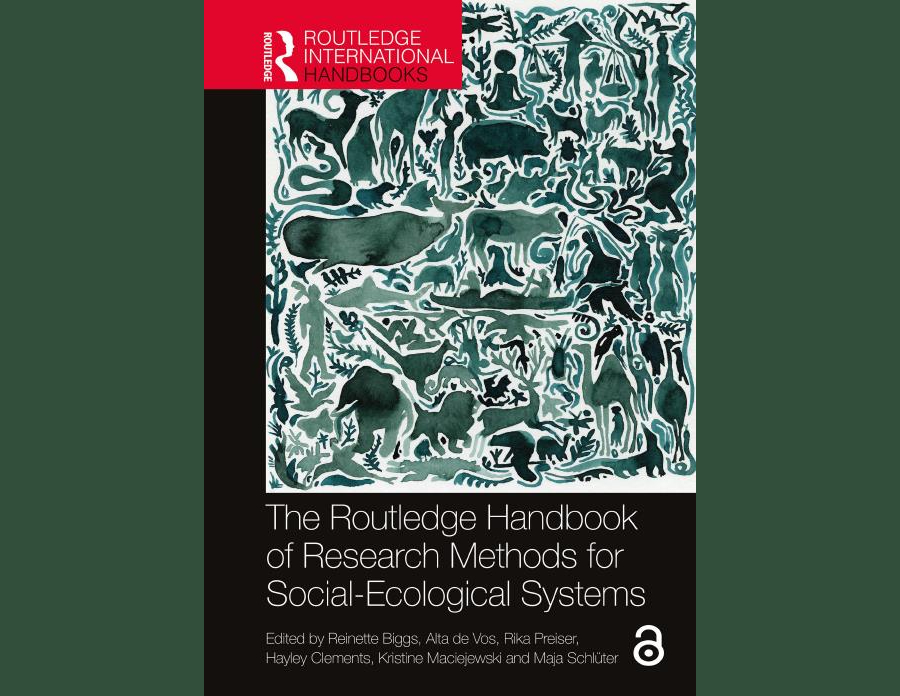
Advancing Sustainability Science and Practice: New Handbook of Research Methods for Social-Ecological Systems now available
The first book to provide a guide and introduction specifically focused on methods for studying social-ecological systems, or SES, has been published. An Open Access colour version is freely available for download, and a hardcover black-and-white version is available for purchase.
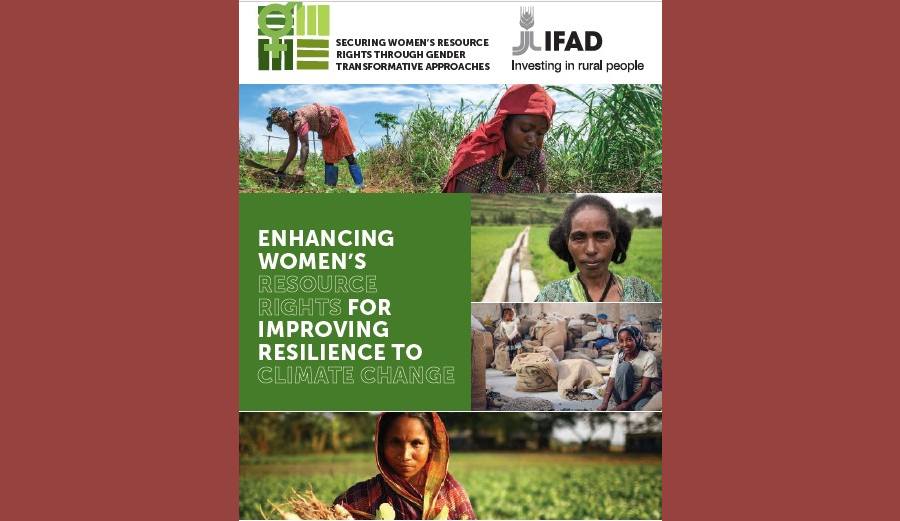
Enhancing women's resource rights for improving resilience to climate change
This Brief summarizes relevant findings from socio-legal analyses, combining the review of key legal and policy documents and literature on existing barriers to the recognition of women’s land rights. The review analyzes existing tenure systems, identifies tenure interventions recognizing rights to women, as well as barriers constraining their ability to benefit from those rights. The analysis was conducted in four countries – including Ethiopia, Bangladesh, The Gambia and Uganda. These countries’ experiences illustrate the challenges that need to be addressed in order to secure women’s land rights and enhance women’s adaptive capacities – highlighting secure rights are instrumental points – not only for empowering women, but also to strengthen climate action and building resilience.
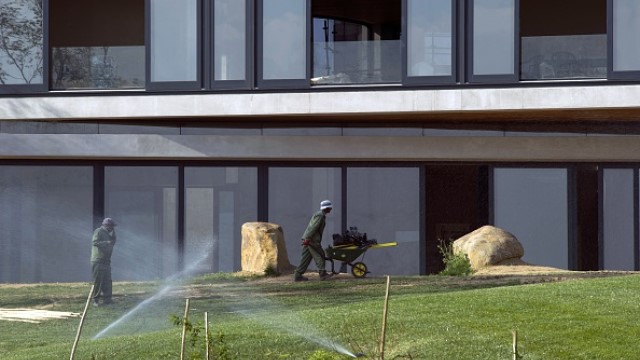
Household gardeners in South Africa: a survivalist life with little protection
The informal sector makes significant contributions to the national economies of most global South countries. In South Africa it constitutes 15% to 30% of all employment.
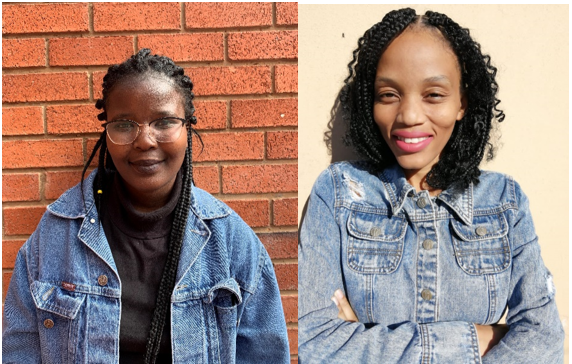
Welcome to two new Master's students from the Living Catchment Project
The Department of Environmental Science extends a warm welcome to two new Master’s Students who will be joining DES as part of a new project called the Living Catchments Project: Kwanele Siyengo and Philisa Dunyana. Kwanele and Philisa will be supervised by Dr. Jessica Cockburn. They will be conducting research on social learning, multi-stakeholder collaboration and policy engagement in the context of water security and management of ecological infrastructure for catchment management.
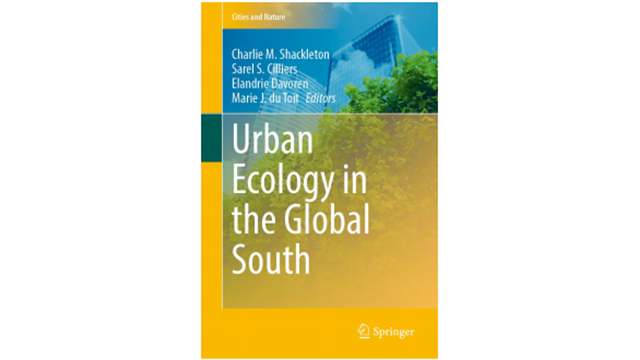
New book from Enviros Staff
This edited compilation of 17 chapters is the latest book offering by DES staff. It is edited by Charlie Shackleton and post-doctoral fellow Elandrie Davoren, along with Sarel Cilliers and post-doc Marié Du Toit, both at Northwest University in Potchefstroom
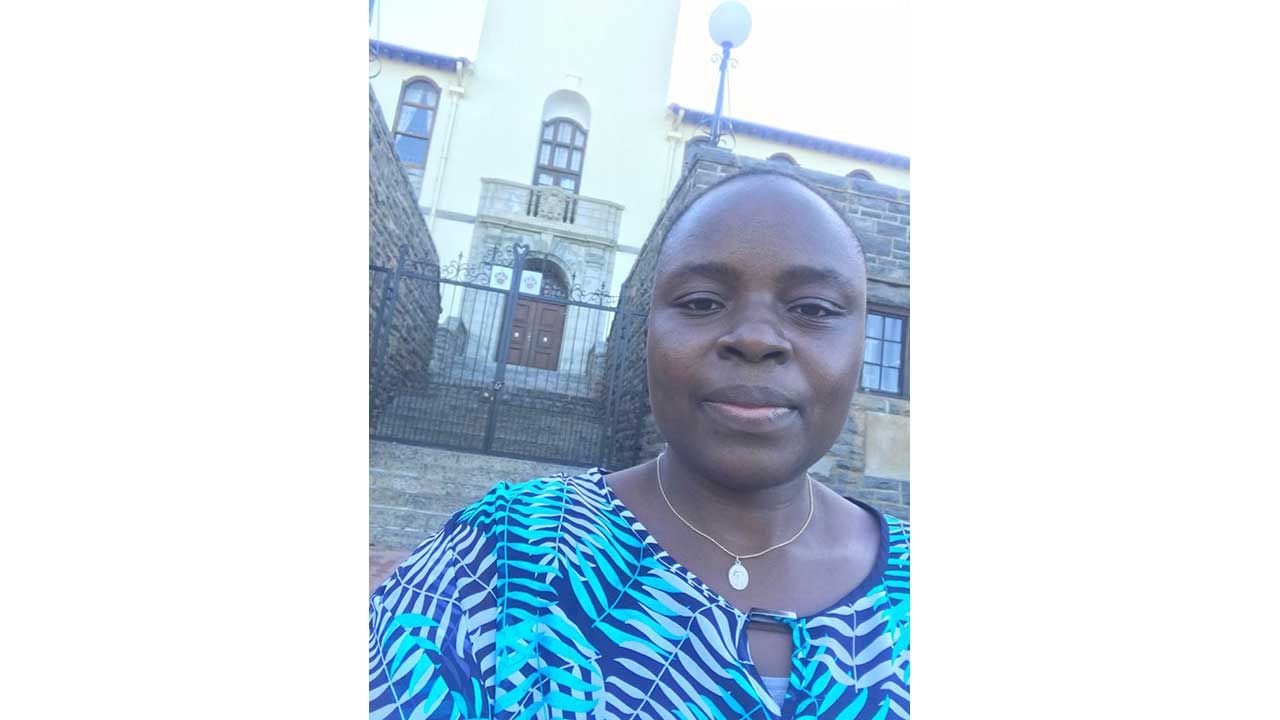
Gisele joins the team
Gisele Sinasson has joined the department as a post-doctoral fellow.
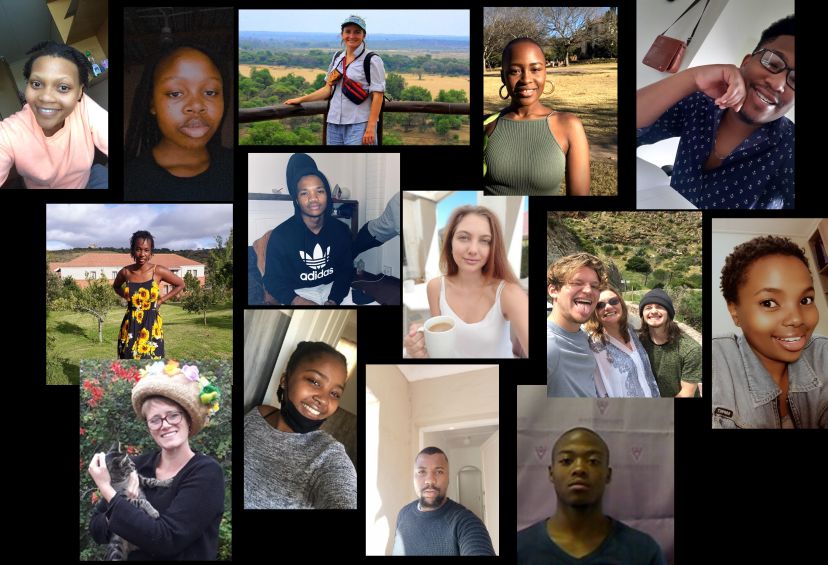
Living and learning in lockdown.
Living and learning in lockdown. While the Department of Environmental wasn't out and about much and so we didn't generate much news, it was still a big year for us all. Here we share our stories of learning in lockdown, reflecting on the highs and lows and lessons learnt during the difficult transition to working at home during the COVID-19 pandemic in 2020. No doubt you too will have your own story of learning in lockdown -- connect with us on Twitter to share: @DESRhodes1
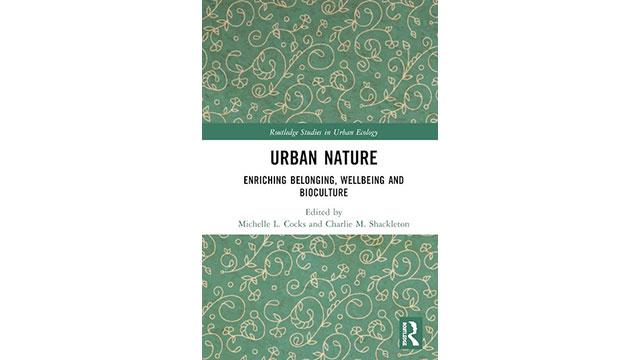
New book publication by Charlie Shackleton and Michelle Cocks
Urban Nature: Enriching Belonging, Wellbeing, and Bioculture

Eastern Cape alliance launches digital network to fight Covid-19 in rural areas
As Covid-19 infections escalate in the Eastern Cape, confusion, misinformation and anxiety are rife. The need for clear, reliable and locally relevant information is urgent, especially in isolated rural communities. A coalition of farmers, students, academics and activists are using WhatsApp messages in vernacular isiXhosa to get the message out.
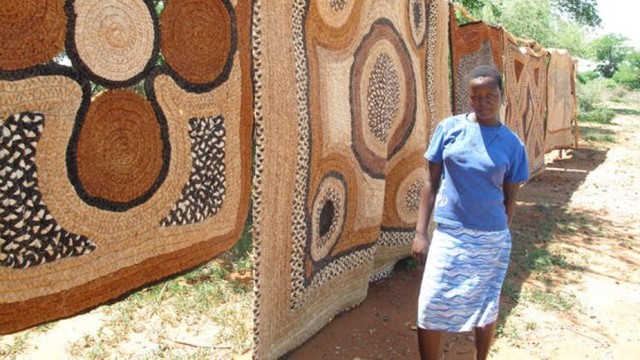
Why the world needs to ensure wild species are used sustainably
The COVID-19 pandemic has led to a worldwide crisis of food insecurity and unemployment. The International Monetary Fund (IMF) warns of rising hunger and poverty.
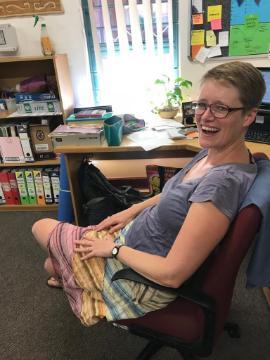
Jessica joins the team
Jessica joined the Department of Environmental Science as a Lecturer on 1st December 2019. This has felt a bit like a ‘homecoming’ for Jessica who completed her PhD in this Department in 2018. She was supervised by with Georgina Cundill, Sheona Shackleton and Mathieu Rouget and the title of her thesis was ‘Stewardship and collaboration in multifunctional landscapes: a transdisciplinary enquiry’.
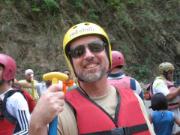
Charlie appointed to the NFAC
At the end of 2018, Charlie Shackleton was appointed to the National Forestry Advisory Council (NFAC) for a three year term. This is a statutory council set to advise the minister of Agriculture, Forestry & Fisheries on all aspects relating to indigenous forests, plantations and woodlands in the country.
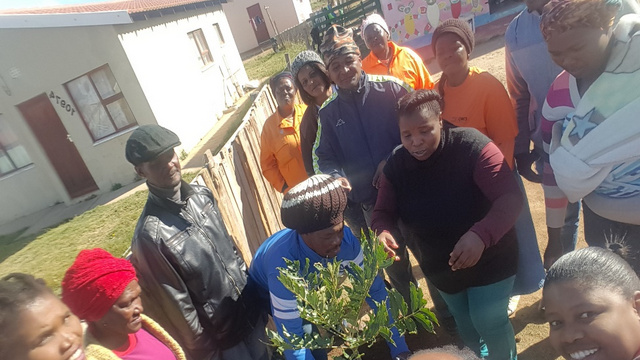
PhD student takes greening project to Joza
Nanamhla Gwedla is a PhD student in the Department of Environmental Science, under the supervision of Professor Charlie Shackleton, and Dr Lausanne Olvitt from the Environmental Learning Research Centre.
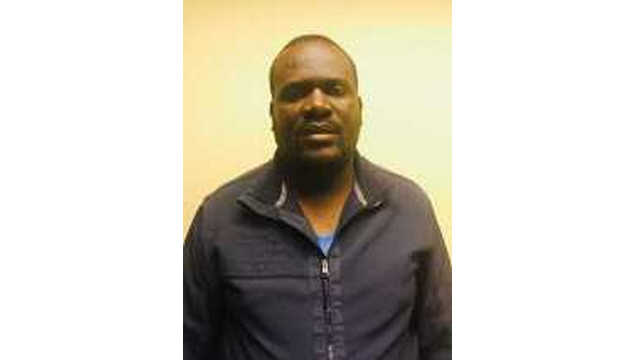
Dr Ruwanza joins the team
After the departure of Prof Sheona Shackleton, her replacement has been given to Dr Ruwanza, a young ecologist and conservationist whose research focus is on restoration ecology and management of degraded ecosystems. He will start as a senior lecturer on the 1st July.
Distinguished Alumni Award
Georgina Kemp (nee Cundill), former student, staff member and now research associate, was named as one of the recipients of the 2018 Distinguished Alumni Awards.
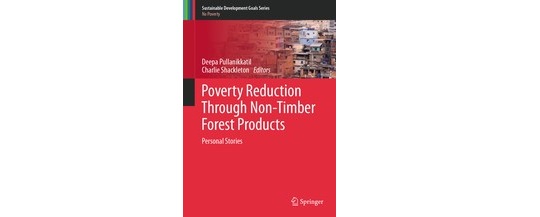
DES celebrates the publication of a new book
The department is proud to celebrate the recent publication of a new book, edited by former post-doctoral fellow Dr Deepa Pullanikkatil and Professor Charlie Shackleton. It is part of the new, presitgious Sustainable Development Series published by Springer.
Gladman awarded NRF (Y1) Rating
Dr Gladman Thondhlana has been awarded the NRF Rating category Y1) which is awarded to, “A young researcher (less than 40 years and within 5 years from PhD at the time of application) who is recognised by all or the overriding majority of reviewers as having the potential to establish him/herself as a researcher of considerable international standing on the basis of the quality and impact of his/her recent research outputs”.
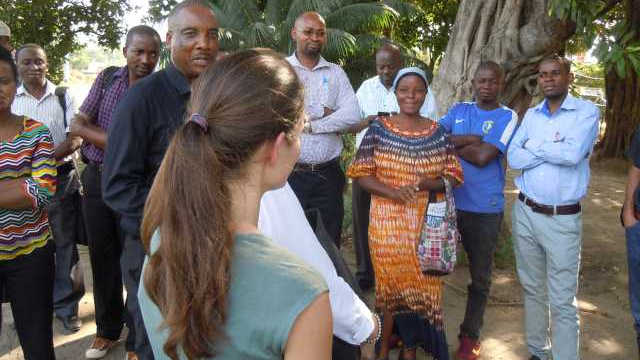
AFRICITY Project gets underway
The multi-country AFRICITY project got under way in the first half of 2017. AFRICITY is a three-year collaborative research and training project with sites in Malawi, South Africa and Tanzania. It seeks to examine the causes and effects of environmental change and resource use in Sub-Saharan African cities. The project will consider the rapid social and economic transformation processes and their external and internal drivers, and assesses the barriers for potentials of social adaptability in the context of inequity, risk, resourcefulness and rights to the city, all with an emphasis on their role, potential and governance of urban green infrastructure.

Editor's choice for Gladman's paper
Gladman's paper, entitled "Local people and conservation officals' perceptions on relationships and conflicts in South African protected areas" has been selected as one of the Editor's choices in the International Journal of Biodiversity Science, Ecosystem Services & Management. The paper was selected, among other reasons, as being the most downloaded and for having made a great impact on social media.
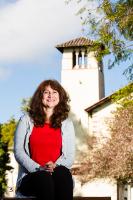
Farewell to Sheona
This month marks the end of Sheona Shackleton’s formal career at Rhodes University. Sheona has been associated with the Department of Environmental Science since 2000, taking up a permanent position in the Department in June 2008. During this time she progressed from lecturer to full Professor, which she obtained in 2013. She has been head of department for the last four years.
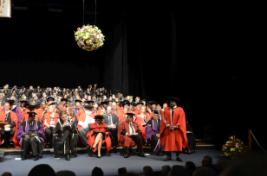
2016 Distinguished Teaching Award for Dr Thondhlana
The Rhodes University Distinguished Teaching Award is presented annually to a new staff member with ten or fewer years’ experience of teaching in higher education who is able to demonstrate exceptional contribution to teaching in his/her discipline.

New postdoc: Dr Penny Mograbi
Penny joined the Department as a post-doctoral Research Fellow under Prof. Charlie Shackleton’s SARChI Chair in January 2017. Her research interests lie in human-environment interactions and she has a penchant for exploring these themes through spatial ecological methods.
DES welcomes new post-doc Deepa Pullanikkattil
Deepa Pullanikkatil has worked in India, Lesotho, Malawi and Swaziland. She worked at Leadership for Environment and Development (LEAD) Southern and Eastern Africa based in Malawi on climate change adaptation projects from 2010 to 2014, before moving to Swaziland where she is currently based.
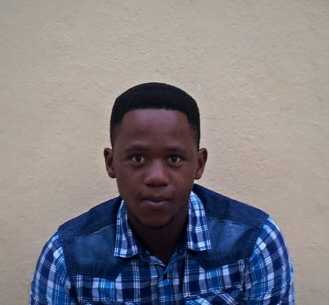
New RUESSPA bursary student
This year sees the awarding of our annual RUESSPA bursary to Ntuthuko Mbhele, a second year. Ntuthuko hails from Dimbaza just outside King Williams town. He is doing a BSc, majoring in Geology and Environmental Science, with Anthropology 1 added for interest. He is interested in building a career in Environmental Geology.
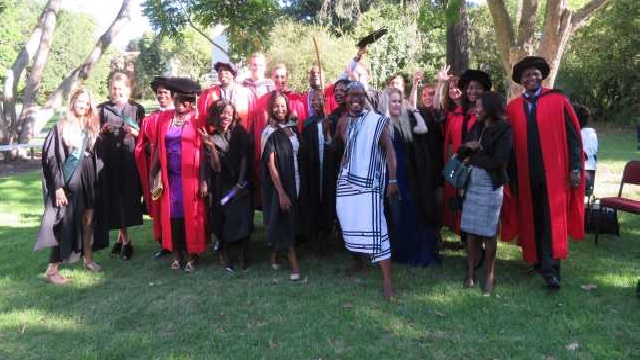
2017 Graduation
This year saw a record number of senior graduations for our department. There were five PhD students, nine Masters students and a total of twelve honours graduations.

DES Alumni at the World Bank
Shafiek Hoossein, a former Masters student in the dept, and who now works at the World Bank, is mentor to a new recruit. Mercedes Stickler, who graduated with a Masters in Environmental Science in 2009.
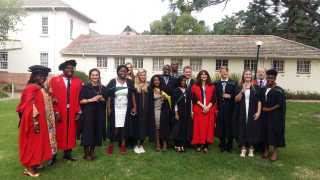
2016 Graduation
This year saw a total of 26 of our students graduating. 1 PhD (Precillia Tata-Ngome), 5 Masters (Heather Maseko, Rebone Modipa, Kyle Langley, Tracey Steyn and Karabo Chadzingwa) and 20 Honours students. Well done to you all. Our department currently has 50 senior postgrads, 12 Honours students and 140 undergraduates and we are one of the most productive departments in the University in terms of per capita research outputs.
New collaborative interdisciplinary project on understanding place, identity and attachment to urban green spaces and places
Enviros is part of a new interdisciplinary project that has recently been awarded R2.8 million by the national Research Foundation to examine urban dwellers’ needs and aspirations with respect to green spaces and biodiversity. The project is a collaboration between the Departments of Anthropology (Dr Michelle Cocks) and of Environmental Science (Prof Charlie Shackleton) and the Faculty of Law (Dr Gustav Muller), all at Rhodes University.
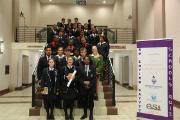
2015 Annual Schools quiz
On the 16th of September, the 2015 Honours class hosted the eighth annual schools quiz. This event started in 2008 as part of the Dept's community engagement initiative and has become an event on the calendar of most of the schools in Grahamstown. This year ten schools participated, with each school being represented by three learners each from Grade 11. This year Victoria Girls High came first, with Graeme College second, DSG third and fourth place to Ntsika High.
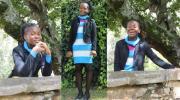
2nd year wins 2015 CE award
Angel Ancha Bulunga, a 2nd year in our dept was the winner of the VC's 2015 Community Engagement Award. She was also the student volunteer of the year in 2014. Angel has been a member of the student volunteer programme since her first year at Rhodes. She has served as one of the student leaders at Home of Joy for the past two years, and in that time she has spear headed a well-planned and directed approach to academic support activities at the Home
From Theory to Practice
The 2015 People and Protected Landscapes honours class completed an internship with the Swartkops Conservancy this week. The internship aims to get students stuck into the realities of conserving biodiversity outside of protected areas, and on a human dominated planet. This year, the class got involved in thinking about these issues in an urban context. They assisted the Conservancy with an education day for local school kids, running a lesson on bird migrations and showing children how the estuary is connected other parts of the world. They also conducted a public opinion survey that will form the basis for an awareness raising program surrounding a critically threatened wetland in the estuary system. Throughout, the class was tasked with cross checking and probing the extent to which the theory they have learned in class assists them to come to grips with real life situations.
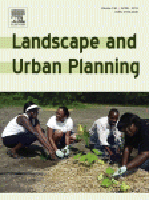
DES Paper is Editor's choice
A new paper by DES authors entitled "Multiple benefits and values of trees in urban landscapes in two towns in northern South Africa" and published in Landscape and Urban Planning is the Editor's choice. "This is to congratulate you and your co-authors on your very fine paper in V. 136 of Landscape and Urban Planning. Because of its clarity and significance, I selected it as the Editor's Choice in its volume. That allows anyone online to have free access to your paper for six months. I hope you'll let lots of your colleagues know that they can download it free. It's great work, and I hope that you'll continue to contribute your work to the journal!"
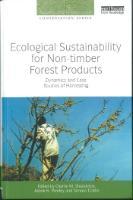
New book publication for the Department
The book "Ecological Sustainability for Non-timber Forest Products: Dynamics and case studies of Harvesting" is edited by Charlie Shackleton, Ashok Pandey and Tamara Ticktin. In addition to being the editor, Charlie contributed three chapters to the book and Georgina Cundill contributed a fourth.
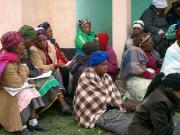
DES wins Community Engagement Award
The Jongaphambili Sinethemba Project Group (Professor Sheona Shackleton, Dr. Georgina Cundill, Mr. Nick Hamer, Mr. Monde Ntshudu, and Professor Heila Lotz - Sitsika) from the Department of Environmental Science, are the recipients of the 2014 Vice Chancellor’s Distinguished Award for Community Engagement. The engaged research project into climate change and adaptation in rural contexts, where vulnerability is exacerbated by multiple stressors, undertaken by the group, involved the participating communities of Lessyton and Willowvale from the conceptualisation stages of the project. The research project was named Jongaphambili Sinethemba (looking forward, we have hope) by the communities involved.
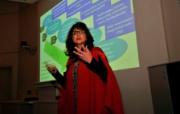
ASSAF inaugurates new members
The Academy of Science of South Africa (ASSAF) inaugurated 23 new Members at its Annual Awards and Inauguration Ceremony on 14 October 2014 swelling its numbers to 445, all of whom are recognised as among South Africa’s top scholars. Our very own Head of Department, Prof Sheona Shackleton was among those inaugurated as a new member. Well done Sheona!
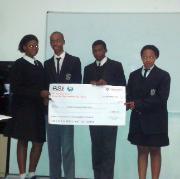
Annual Schools quiz won by Mary Waters
2014 marks the 7th year that our department, in conjuction with our Honours students, has hosted this increasingly popular event among our local schools. This year saw Mary Waters High School winning for the very first time. They took home a cheque of R3000 for their school. Well done Mary Waters.
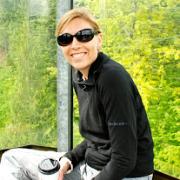
DES Welcomes Alta de Vos
Alta started as a lecturer in the department on the 1st September. She started her academic training as a behavioural ecologist, completing a PhD on the interactions of fur seals and great white sharks at the University of Cape Town, in 2010. After her PhD she left academia for two years to manage the MAPA Project, a non-profit initiative that aims to make African conservation more visible online. In this role, she taught conservationists how to use free online tools to communicate their work and has been instrumental in setting up the beginnings of an online registry and map of African conservation areas and actions. She remains involved with this initiative on a volunteer basis and firmly believes in working collaboratively with non-profits and other public-benefit organisations to co-develop research agendas.
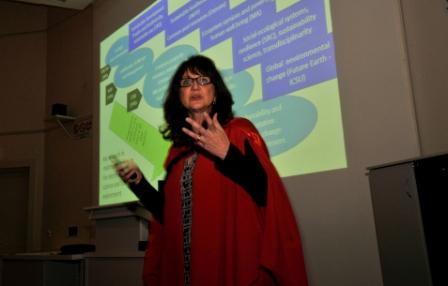
Sheona's inaugural speech
Linking livelihood and ecosystem services in a context of heightened vulnerability. Climate change is real, but its impacts cannot be measured in isolation. In her Inaugural Lecture, Professor Sheona Shackleton of the Department of Environmental Science looked at the links between livelihoods, vulnerability, ecosystem services and climate change. Professor Shackleton has been working in this arena for most of her academic career. In the past few years she has been doing a lot more applied research around climate change adaptation, which she describes as interdisciplinary, challenging and exciting.
DES awarded R930 000 contract from the national NRM
The NRM (National Resources Mangaement) Programme is a collective of all the Working-for… programmes (WfWater, WfLand, WfEnergy, WfForests, WfCoast, WfWetlands etc.). In 2007 the Rhodes Restoration Research Group was established to provide guidance and scientific oversight to the Eastern Cape Restoration Programme (principally the thicket restoration, WfLand, and the clearing of alien plants, WfWater). One of the benefits accrued through this contract was the provision of student bursaries from the DEA, which helped a number of students graduate in the field of restoration ecology and applied sciences as well as result in the publication of several papers from this work.
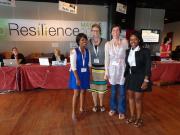
DES well-represented at the Resilience2014 Conference
Dr. Georgina Cundill, two masters students (Karabo Chadzingwa and Nokuthula Dubazane), and a new Phd student, Jessica Cockburn, all travelled to Montpelier in France this month to attend the Resilience2014 conference (http://www.resilience2014.org).
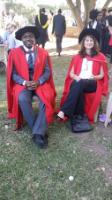
Graduation 2014
This year's graduation saw the University awarding 1 PhD, 4 Masters and 14 Honours degrees to our students. PhD: Omar Makame's work, supervised by Prof Sheona Shackleton, was on the vulnerability and adaptation of Zanzibar coastal communities to climate variability and change. Masters: Keitometsi Ngulube Abu-Basutu's work, supervised by Prof Charlie Shackleton looked at the contribution of wold foods to individual and household food security in the context of increasing vulnerability due to HIV/AIDS and climate change.
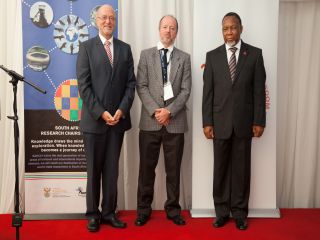
Public announcement of the new Research Chairs
This public announcement was made at the Sheraton Hotel in Pretoria on 7th March 2014. Charlie Shackleton is seen here with Deputy President, Kgalema Motlanthe. Charlie was awarded the Research Chair in Interdisciplinary Science in Land and Natural Resource Use for Sustainable Livelihoods.
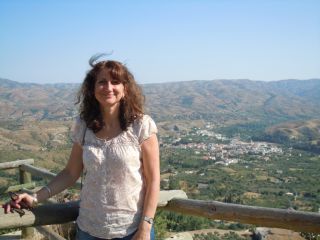
New Head of Department: Prof Sheona Shackleton
The department welcomes it first female and fourth HOD since its inception as a full department in 2002. Sheona follows on from Prof Christo Fabricius, Prof Charlie Shackleton and Prof Fred Ellery. Sheona joined the department as a full-time staff member in July 2008, following eight years as an independently funded research associate in the department.
Bursary
A R50,000 per annum Masters bursary is on offer to a student interested in pursuing the following research area - "Towards sustainable landscapes: harnessing social learning for collective action".
Vacancy - Senior Lecturer
The department is looking to fill the position of Senior Lecturer
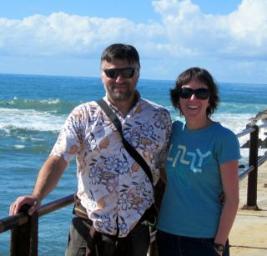
Visiting PhD student from Chile
Jaime Aburto spent the month of August in the department working with Dr Georgina Cundill on a number of papers for his Phd research.